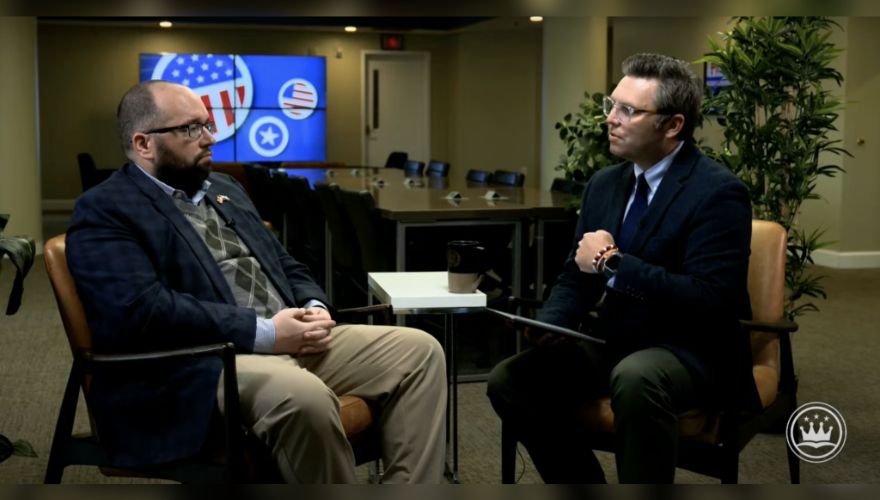
Dan Darling and Brent Leatherwood discuss maintaining a Christian witness in the public arena during an online forum April 22 hosted by the Ethics & Religious Liberty Commission.
NASHVILLE (BP) – The Ethics & Religious Liberty Commission (ERLC) hosted an online event Monday, April 22, which focused on how Christians can approach political engagement, even beyond this year’s presidential election.
The event featured a conversation between ERLC President Brent Leatherwood and Daniel Darling, director of The Land Center for Cultural Engagement at Southwestern Baptist Theological Seminary. The two discussed a variety of topics related to engaging politics in today’s often divisive culture.
The full conversation, titled “Bringing Hope to an Election Year: Christian Political Engagement in 2024 and Beyond,” can be found on the ERLC’s YouTube Channel.
Darling, a former ERLC staff member, said a vital place for Christians to begin with political engagement that is often missed, is praying for government officials.
“That’s something that I often have to remind myself to do,” Darling said. “Am I praying for our leaders as often as I’m complaining about them or posting about them. In 1 Timothy 2, Paul urges Timothy to pray for everyone in authority, and let’s remember they’re praying for Nero who would send Paul to his death.
“To be in public office today, to put yourself forward, is to open yourself up to a lot of abuse and a lot of just mockery and sort of scrutiny of your life. Anyone stepping forward we should pray for.”
Leatherwood and Darling went on to discuss topics including pro-life advocacy in a post-Roe world, foreign policy in international conflicts such as in Ukraine and Israel, ways in which the ERLC advocates for Southern Baptists in the public square and how Christians should strive to conduct themselves in the political arena and in their day-to-day lives.
Specifically regarding this year’s upcoming presidential election, Darling said a temptation Christians can face is “to allow a political moment or a political figure to divide us from our fellow brothers and sisters.”
“Let’s by all means engage, let’s make arguments, let’s speak against evil, but let’s not let minor differences with other Christians separate us,” Darling said. “Let’s determine and say ‘I am united with my brothers and sisters by something that unites us far more than should divide us.’”
He encouraged pastors to address the election and how Christians approach it, rather than shying away from the topic.
“We can’t pretend it’s not happening,” Darling said. “I think pastors need to address the election in the sense of ‘OK folks, we all know this is happening, here’s how we want to conduct ourselves as God’s people. What does it look like to live out and steward our Christianity in this moment. God is not surprised by this moment. He’s put us here in 2024 for a purpose. So how do we steward this moment?”
Although many people are focusing their political engagement on the presidential election, Leatherwood emphasized there are many more impactful political decisions to be made at the state and local level.
“There are a lot of races below that particular question on the ballot (presidential ballot) that deserve and really need Christian engagement,” Leatherwood said. “One thing that we tend to underappreciate, I would say, in the church is the great good that can be accomplished at those local levels through those local races.
“We underestimate how much our voice can really matter in those races that are closest to home. Oftentimes if we want to change a policy or change the culture that we’re living in, speaking into those races will accomplish a great deal more good, than even at the presidential level.”
Even further, Darling challenged some Christians to courageously consider the call to pursue some form of public office.
“Sometimes the nastiness of our politics compels Christians to say ‘I just don’t want to be involved with that,’ but I actually think that’s a mistake,” Darling said. “We actually need good Christians, good men and women of faith to step up and say ‘I see this as a calling. I want to run for office, because I think God has called me to be in this place.’
“Running for office, being involved with politics, is a way of loving your neighbor. There’s going to be somebody in these positions, so we have to ask ourselves do we want someone of Christian character and virtue in these positions, or are we just going to sort of leave it alone and see what fills the vacuum? And often what fills that vacuum is not better than having a Christian there.”
(EDITOR’S NOTE – Timothy Cockes is a writer in Nashville.)


